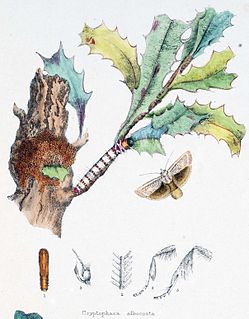Related Research Articles

Eudocima phalonia, the common fruit-piercing moth, is a fruit piercing moth of the family Erebidae. The species was first described by Carl Linnaeus in his 1763 Centuria Insectorum. It is found in large parts of the tropics, mainly in Asia, Africa and Australia but introduced into other areas such as Hawaii, New Zealand and the Society Islands. It is one of major fruit pests in the world.

Cryptophasa is a genus of moths of the family Xyloryctidae.
Arignota stercorata is a moth in the family Xyloryctidae. It was described by Thomas Pennington Lucas in 1894. It is found in Australia, where it has been recorded from New South Wales and Queensland. It is also found in Papua New Guinea.
Catoryctis leucomerata is a moth in the family Xyloryctidae. It was described by Oswald Bertram Lower in 1893. It is found in Australia, where it has been recorded from New South Wales, Queensland, South Australia, Victoria and Western Australia.
Cryptophasa sarcinota is a moth in the family Xyloryctidae. It was described by Edward Meyrick in 1890. It is found in Australia, where it has been recorded from Queensland.
Cryptophasa tetrazona is a moth in the family Xyloryctidae. It was described by Oswald Bertram Lower in 1901. It is found in Australia, where it has been recorded from New South Wales, Queensland, Victoria and Western Australia.
Cryptophasa stenoleuca is a moth in the family Xyloryctidae. It was described by Oswald Bertram Lower in 1894. It is found in Australia, where it has been recorded from New South Wales, the Northern Territory, Queensland and Western Australia.
Cryptophasa aglaodes is a moth in the family Xyloryctidae. It was described by Oswald Bertram Lower in 1894. It is found in Australia, where it has been recorded from the Northern Territory, Queensland, South Australia and Victoria.
Cryptophasa ochroleuca is a moth in the family Xyloryctidae. It was described by Oswald Bertram Lower in 1892. It is found in Australia, where it has been recorded from the Australian Capital Territory, New South Wales, South Australia and Victoria.
Cryptophasa isoneura is a moth in the family Xyloryctidae. It was described by Oswald Bertram Lower in 1902. It is found in Australia, where it has been recorded from Queensland, South Australia and Victoria.
Cryptophasa diplosema is a moth in the family Xyloryctidae. It was described by Oswald Bertram Lower in 1903. It is found in Australia, where it has been recorded from Queensland.
Cryptophasa citrinopa is a moth in the family Xyloryctidae. It was described by Oswald Bertram Lower in 1915. It is found in Australia, where it has been recorded from New South Wales and Queensland.

Cryptophasa albacosta, the small fruit tree borer, is a moth in the family Xyloryctidae. It was described by John Lewin in 1805. It is found in Australia, where it has been recorded from New South Wales, Queensland, South Australia, Tasmania and Victoria.
Cryptophasa gypsomera is a moth in the family Xyloryctidae. It was described by Oswald Bertram Lower in 1903. It is found in Australia, where it has been recorded from New South Wales and Victoria.
Cryptophasa melanoscia is a moth in the family Xyloryctidae. It was described by Oswald Bertram Lower in 1903. It is found in Australia, where it has been recorded from Victoria.
Cryptophasa panleuca is a moth in the family Xyloryctidae. It was described by Oswald Bertram Lower in 1901. It is found in Australia, where it has been recorded from Queensland.
Cryptophasa lasiocosma is a moth in the family Xyloryctidae. It was described by Oswald Bertram Lower in 1908. It is found in Australia, where it has been recorded from Queensland and New South Wales.
Cryptophasa tecta is a moth in the family Xyloryctidae. It was described by Thomas Pennington Lucas in 1894. It is found in Australia, where it has been recorded from the Northern Territory and Queensland.
Cryptophasa phycidoides is a moth in the family Xyloryctidae. It was described by Thomas Pennington Lucas in 1901. It is found in Australia, where it has been recorded from New South Wales and Queensland.
Cryptophasa nubila is a moth in the family Xyloryctidae. It was described by Thomas Pennington Lucas in 1894. It is found in Australia, where it has been recorded from New South Wales and Queensland.
References
- ↑ Savela, Markku (25 April 2016). "Cryptophasa platypedimela (Lower, 1894)". Lepidoptera and Some Other Life Forms. Retrieved 9 July 2020.
- ↑ McMillan, Ian (28 August 2010). "Cryptophasa platypedimela (Lower, 1894)". Xyloryctine Moths of Australia. Retrieved 9 July 2020.
| This article on a moth of the family Xyloryctidae is a stub. You can help Wikipedia by expanding it. |